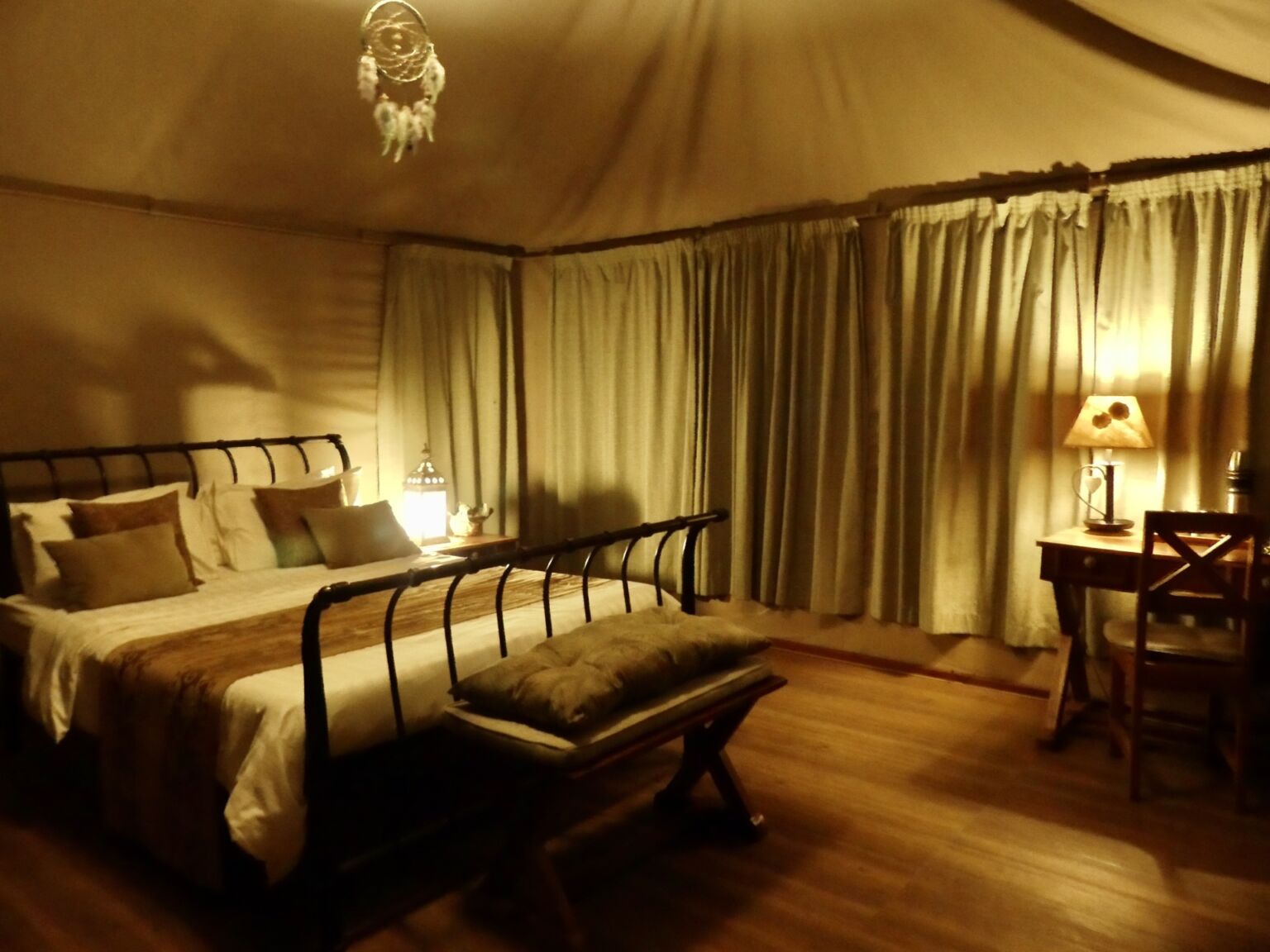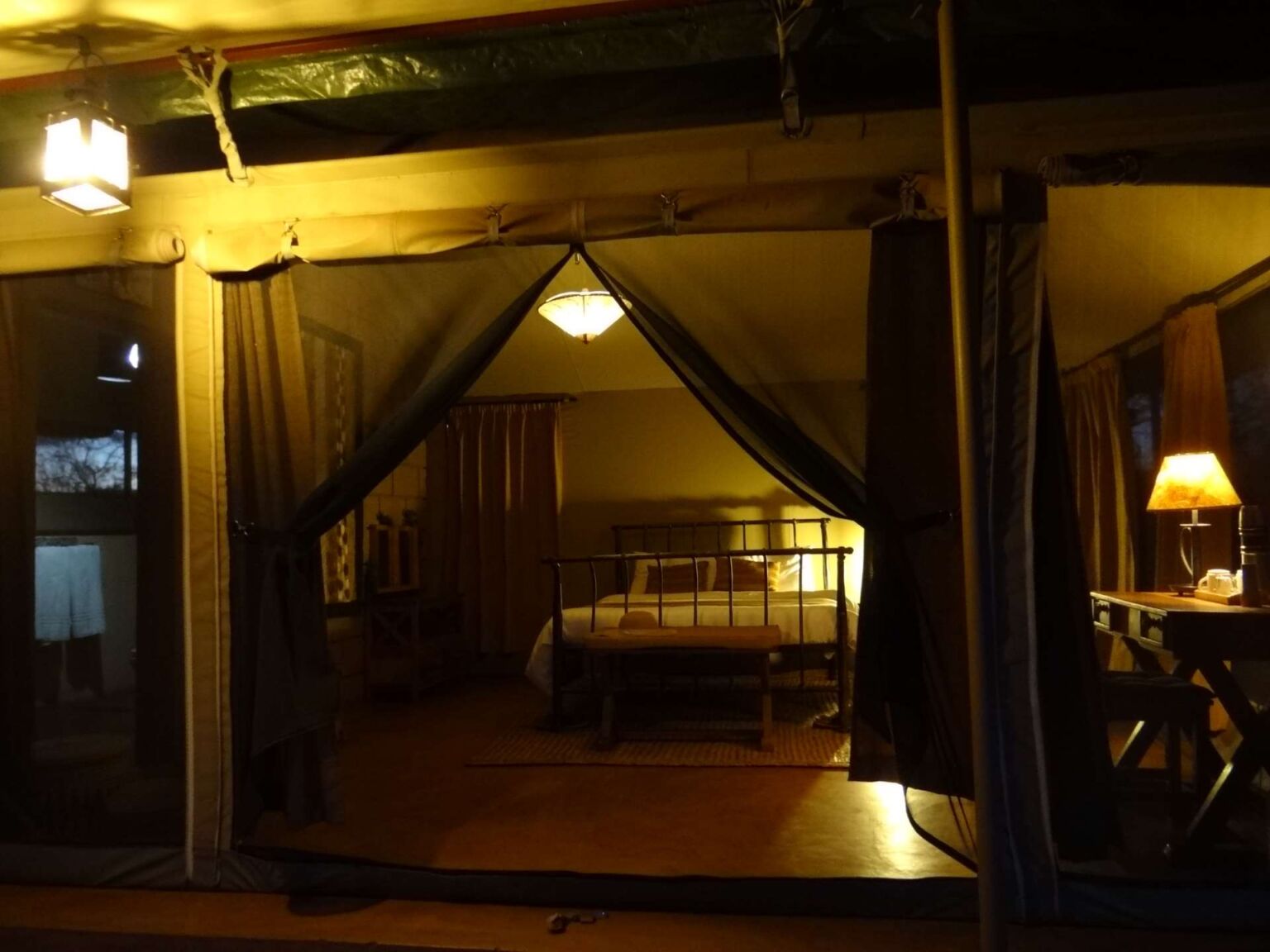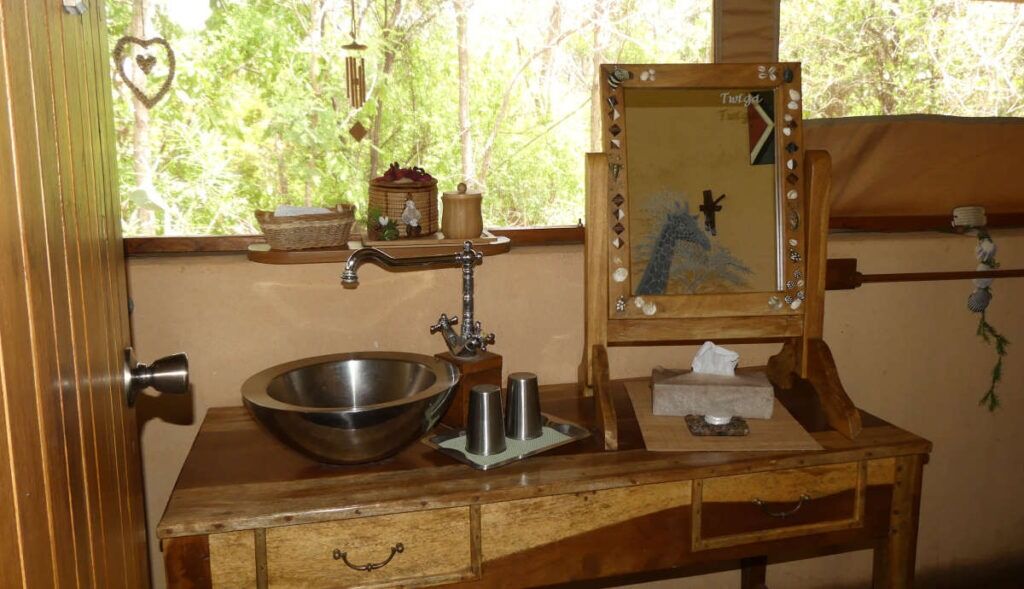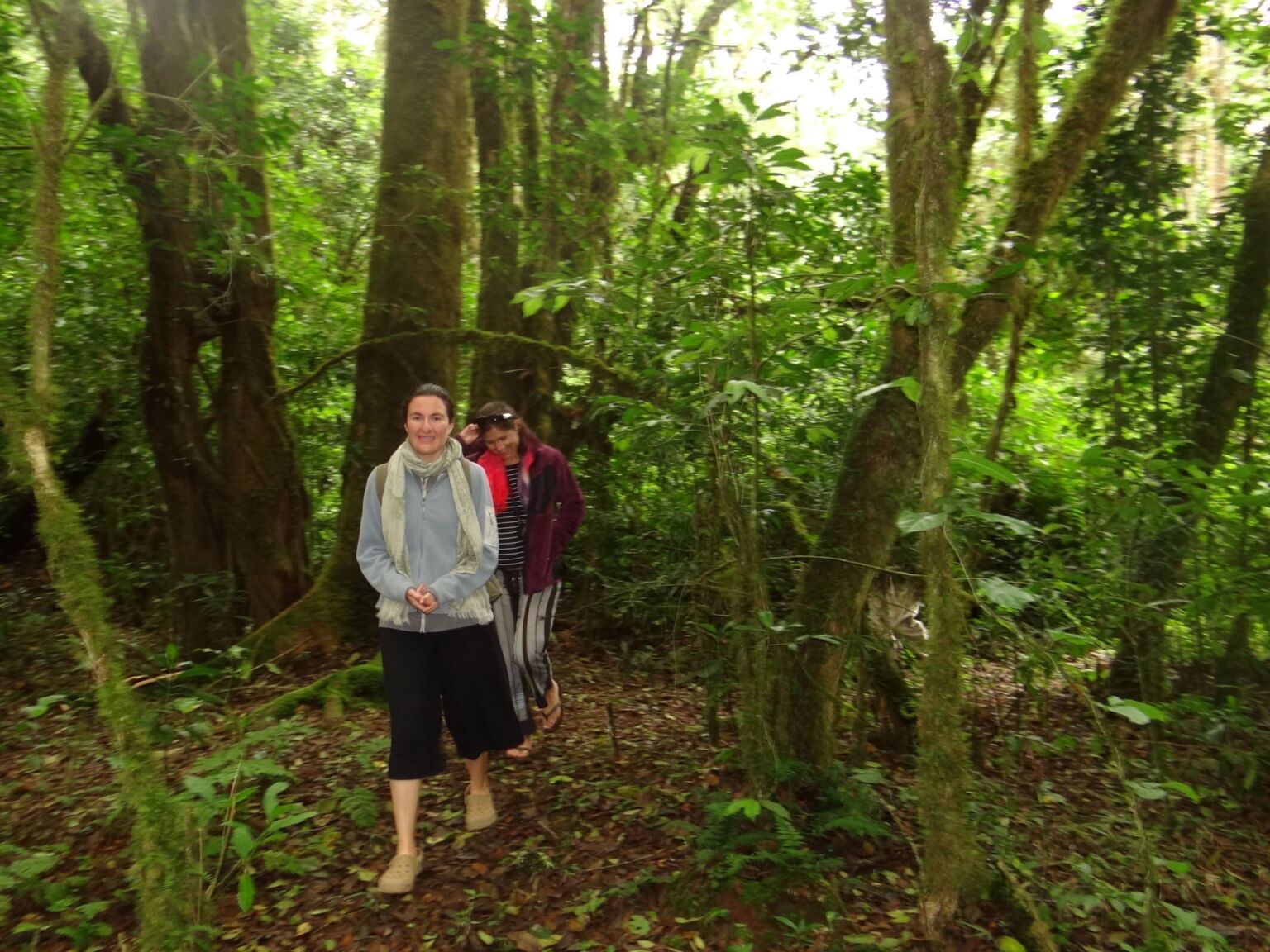This terrific place … put(s) to shame many tented camps that charge so much more for so much less …
Lonely Planet

All the luxuries you are looking for on safari - at an affordable price
... in eco-friendly natural elegance ...
This terrific place is just outside Meru National Park, 2.5km from Murera Gate on the road in from Meru, so you can be inside the park in minutes.
Top choice in Kenya
- Lonely Planet, 2024
iKWETA Safari Camp has earned Tripadvisor Certificate of Excellence | Travellers' Choice award 11 years in a row - from 2014-2024... See Guest Reviews and Other Acclamations.
iKWETA Safari Camp received the GOLD AWARD from Tourism Regulatory Authority of Kenya "in recognition of quality service performance" at a national award ceremony held on 9 February, 2024

word clouds
based on 316 guest reviews on Tripadvisor (as on 2022-03-23)

The landscape is so stunning even if you don’t see animals every 30 seconds you’ll be captivated by the scenery...
- Visitor, Meru National Park
Explore the complete wilderness of Meru National Park, one of Kenya’s most beautiful protected areas – picturesque, diverse, pristine, abundant wildlife, uncrowded –
… from the Affordable Safari Luxury and eco-friendly natural elegance of iKWETA Safari Camp…
MEET
THE BIG 5
elephants, rhinos, lions, buffalo, leopards
ELEPHANTS. The Meru Conservation Area is the second largest contiguous elephant habitat in Kenya after the Tsavo National Parks.
RHINOS. Meru National Park is one of the best places in Kenya to see rhinos in the wilderness. At last count, the Rhino Sanctuary was home to 42 black and 86 white rhinos.
LIONS. Meru National Park is famous for its lions. It is especially associated with Elsa the Lioness and the film “Born Free”, a 1966 British drama film starring Virginia McKenna and Bill Travers as Joy and George Adamson, a real-life couple who raised Elsa, an orphaned lion cub, to adulthood.
Elsa’s Grave is at the southern end of the park, off the bank of the Ura River. A family of lions in Meru National Park – “Elsa’s Pride” – is named in her honour. Presently, the lion population is estimated to be around 80.
BUFFALO. Meru National Park is home to some of Kenya’s largest herds of buffalo.
LEOPARDS. They are there in numbers – but they are stealthy and camouflage well. Some guests are lucky to spot them – making it one of the highlights of their safari adventure in Meru National Park…
Meet
the other
animals
...cheetahs, plains zebra, Grevy’s zebra, giraffes, hippos, lesser kudu, oryxes, gerenuks, hartebeest, gazelles…
birdwatchers’
paradise…
recorded
Meru National Park is trully a birdwatchers’ paradise due to its diverse avifauna, including the threatened Jungle Babbler, 8 species of Kenya Mountains Endemic Bird Area, and 59 of the 94 Somali-Masai biome species that occur in Kenya.
Visitors may see regionally threatened species such as the Martial Eagle and African finfoot.
Some of the unique birds watchers are likely to see include Malachite Kingfisher, Von der Decken’s Hornbill, Squacco Heron, Saddle-billed Stork, and the Kori Bustard.
NOW SAY HELLO
TO AFFORDABLE
SAFARI LUXURY
natural elegance

Finally, affordable luxury
at Meru National Park ...
Meru is one of my favourite parks in Kenya.
The problem was always that there was only basic or 5-Star accommodation.
iKWETA Safari Camp fills the gap with a very nice tented camp just outside the main gate. Very nice tents, good food and friendly staff and excellent location.- International Tour Operator from The Netherlands, in 5-Star review in Tripadvisor





iKWETA has an eco-friendly approach to design, layout, and operations to ensure guests enjoy natural elegance and comfort on safari at Best Value for Money
– We have planted, continue to plant and to maintain hundreds of indigenous and other species of flowering and non-flowering plants, shrubs, and trees to green and beautify our natural environment, and to create shade and a cool micro-climate in an otherwise semi-arid area.
– We align ourselves with Kenya Government campaign on achieving 15 billion trees in the country by 2032 by continually planting and maintaining suitable tree species in our Camp.
– The eco-friendly design and layout of iKWETA Safari Camp emphasize natural elegance.
– In the guest Tents, the floor-to-ceiling-netting on three sides of each Tent, and window-to-ceiling-netting in the en-suite bathroom, facilitate cross-ventilation of fresh air during the day and cool freshness at night, this in line with our semi-arid natural environment.
– Throughout iKWETA Safari Camp, attention is given to detail, including in the overall layout of the facilities, the gardens and water features, in the use of local materials, in the decor and decoration, in the furnishings, and in the lighting – all intended to be in harmony with our natural environment.
– We harvest and conserve rain water in earth dams for greening our environment.
– We utilize solar pumping to irrigate through driplines and we employ trenching to redistribute flood water on our grounds.
– We utilize solar energy for borehole water pumping, for water heating for the guest Tents, and for lighting in selected areas.
– We use grease traps at our kitchens to filter oils and other organic wastes.
– We filter grey water from the kitchens, and from the guest Tents and other areas and recycle it into our greening efforts.
– Our cats provide a safe, long-term, green solution to rodent control in our Camp that is nearly 100% effective.
– We have phased out use of plastic water bottles, disposable plastic picnic food containers and cutlery at our Camp.
– iKWETA Safari Camp aims to provide its guests all the luxuries they are looking for on safari – at an affordable price – in eco-friendly natural elegance.
– We grow most of our own fresh vegetables, herbs and fruits. This is part of our business model to offer our guests Best Value for Money. Thus, when in season, we pick directly from our gardens or greenhouses, prepare and serve…
FRESH VEGETABLES AND HERBS
Amaranth [mchicha, terere], arugula, basil, beets, chili peppers, cucumber, cowpeas, egg plants, French beans, kale [leaf cabbage, sukuma wiki], lettuce, pumpkin, salad greens, scallions, spinach, squash, sweet peppers, tomatoes, turnips, zucchini…
FRESH FRUITS
Bananas, dragon fruits, grapes (red and white), mangoes, papaya, passion fruit, watermelon…
OTHER CROPS
Arrowroots, cassava, sweet potato, sugarcane…
Staff at iKWETA Safari Camp celebrate Kenya National Tree Planting Day (on 13 November 2023) by planting scores of indigenous trees to further green and beautify our environment


Amenities
We are owner-operated.
We are – by choice
– a small Tented Camp.
… Only 10 guest Tents.
We offer personalized service and affordable safari luxury accommodations in eco-friendly natural elegance.
– Large swimming pool;
– Mains electricity, with ample power sockets in guest Tents for charging devices;
– High-capacity backup generator in case of mains power outage;
– DSTV in Guest Lounge;
– Free fast Wi-Fi Internet throughout the Camp;
– Improved accessibility for guests with reduced mobility;
– Guides/Drivers accommodation on Full-Board basis, at nominal tariff.
– Flexible meal times;
– All meals cooked to order;
– Vegetarian and vegan dishes always on offer;
– Pre-game drive early morning wake-up calls with coffee, tea and biscuits on request;
– Optional packed Breakfasts and Lunches to accommodate game drives;
– Walking safaris, bush dining, and night game drives in Meru National Park by arrangement (Terms and Conditions apply; see Kenya Wildlife Service guidelines at Reception).

iKWETA nature
trails
Take a leisurely walk along the nature trails of iKWETA Safari Camp, especially after a long game drive or road trip
Guest Reviews
iKWETA Safari Camp opened in November 2011. It has earned Tripadvisor Certificate of Excellence | Travellers’ Choice award 11 years in a row since 2014.
Travellers’ Choice (formerly Certificate of Excellence) recognizes businesses that consistently deliver great service.
Reviews from millions of Tripadvisor travellers place iKWETA Safari Camp in the top 10% worldwide.
A beautiful oasis
We had an amazing stay at Ikweta Safari Camp. The staff were so friendly, the tents are perfect and the food was amazing. It’s really close to Meru National Park so the location is ideal. We saw lions, leopards, elephants, giraffe, black & white rhino and over 50 different species of birds. If you want to have a National park to yourself, this is the place to go. The staff gave us fantastic packed breakfasts to take with us to the park and we were able to relax with drinks at the pool after our game drives. I would recommend this place to anyone coming to Kenya.- 5-Star guest review in Tripadvisor

iKWETA Safari Camp is member of Tripadvisor Customer Council, a select group of industry leaders
5-Star luxury at a very affordable price - a fantastic place!
- 5-Star review in Booking.com by guest from the U.K.
What a fantastic place – 5-Star! The staff were all very friendly, they couldn’t do enough to make you feel at home, and they were all super helpful.
The safari tents were very luxurious, as good as you would get in a camp ten times the price.
There was a lot of attention to detail, large comfy bed, beautiful ensuite with lovely slate decor and decoration. Nothing had been forgotten, numerous attractive lights, desk, a torch, comfy chairs and an outside terrace, and lots of authentic African pictures and decorations.
The camp is set in lovely gardens, with water features and waterfalls, all lit up at night.
There is a nice swimming pool, which is welcome after a hot safari drive.
The dining room has a nice ambience, set within the gardens, and the food was all delicious.
It is also only a couple of kilometres from the Meru National Park Gate, so the camp is well situated.
We couldn’t fault Ikweta Safari Camp, it is fantastic value for money.
Other
acclamations
Top Choice in Kenya
Google My Business
4.3 out of 5
Hotels.com
9.2 out of 10
Superb
SafariNow
Top Pick 2021
Daily Nation (Nairobi, Kenya), October 21, 2015, “Sights of Meru”
Msafiri (Kenya Airways Inflight Magazine), February 2015, Destinations: Features – Meru National Park

Reservations
Accommodation is by advance confirmed reservation. The first night rate, excluding extras, is required as deposit. If multiple Guest Tents are booked in a single reservation, then each Guest Tent’s first night rate will be charged. The full booking balance is due on the day of arrival.
Children of all ages are allowed. Children 2 years and under can stay for free (proof of age required).
“Cashless” is our preferred mode of payment – via direct Bank transfer, M-PESA or major Bank Credit Cards. See also in FAQ under Guest Registration policy.
If you have specific questions, please send us a WhatsApp message to Telephone:
+254705200050, or
+254708235861.
You can also email us using the Contact form on this page and we will get back to you as soon as possible.
To check our current availability, book, and make payment, please click on the link below.
Getting there

BY AIR
iKWETA Safari Camp has a helipad on site for guests arriving by helicopter.
AIRKENYA has scheduled flights to Meru National Park (Kinna Airfield). Guests are picked up by their tour company vehicle or by local guide/driver (by arrangement and at cost to guest).
BY ROAD
There are two major access routes to iKWETA Safari Camp and Meru National Park:
Murera Gate (main entrance)
Ura Gate
Both access routes offer guests spectacular vistas through the Mount Kenya region.

Minimized
1-2-3
express
Guest Check-in
Check-out Procedures
Guests complete Digital Registration (through our online Reservations channel).
[Guests or travel agents not booking through our online Reservations channel will be sent fillable e-Registration form to complete for each guest and return to us by email.]
The procedure is expedited at check-out as well – since payment is always in advance of stay and ‘Cashless’ payment may be made for any extras…
GAME DRIVES
AND BEYOND
Enriching
Guest Experience

Optional excursions
Guest’s Yoga moments
at summit of Gatwe (“Skull” Hill)…

To provide opportunities for cultural contact and interaction with the locals, iKWETA Safari Camp offers its guests a number of optional excursions in the vicinity of or in close proximity to the Camp. Guests use their own vehicle or their tour company’s.
iKWETA staff may accompany on some of the excursions to serve as guide (for a nominal fee). One of the excursions requires 2 rangers to accompany guests (by arrangement). More information at Reception.
Available excursions
Approx. 2 hours. Morning or evening. Latest afternoon departure, around 15:30. Charges: inquire at Reception. “Sundowner” by arrangement (inquire at Reception).
Hike to Gatwe (“Skull” Hill) and enjoy panoramic views of the entire Meru Conservation Area, including Meru National Park, the blue Nyambene Hills [Nyambene Forest and Water Tower], and parts of northern Kenya.
Drive through small-scale tea farm landscapes en route to Nyambene Forest and Water Tower and the dams of Tuuru Water Scheme. Visit Kiegoi Tea Factory, one of Kenya’s “fair trade”** success stories (by arrangement), and other places of interest, including Maria Consolata Shrine at Mukululu Catholic Mission.
Half-day or full-day options may include packed-Lunch in Nyambene Forest. Charges: for guide and conservation fees (for group of any size); inquire at Reception.
**See Note at bottom on the concept of fair trade.
Nyambene Forest and Water Tower is the source of water and livelihood for much of the population in the region of Mount Kenya East (large swathes of Meru, Tharaka-Nithi and Embu Counties). It is the source of the 14 permanent rivers and streams which crisscross Meru National Park thus making it one of the best watered national parks in Kenya.
This excursion takes visitors on a rapid ascend – from around 800m at iKWETA Safari Camp, to around 2,500m – through small market centres and farmlands of scenic landscapes where some of the best quality tea in the world is grown for export.
Kenya tea is one of the top foreign exchange earners, alongside tourism, horticulture and coffee. The growing of tea in this region by small-scale farmers has had a significant impact in uplifting the quality of livelihoods of the local people.
The excursion takes visitors deep into the Nyambene Forest and Water Tower where the dams of the Tuuru Water Scheme are located. A walk in this equatorial forest is a wonderful experience for its serenity, peace and tranquility and because the forest and water tower (like Mount Kenya and Magado Crater [Igombe] (see under excursion), is considered sacred and holy by the Meru people.
Because “water is life”, the Nyambene Forest and Water Tower is central in the spiritual practices and governance systems of the Meru people. Protecting and conserving the forest and water tower is considered paramount for safeguarding the Meru territory itself – that is to maintaining its order, integrity, well-being, and sustainability.
“Oh Ngai o Nyambene ne Igombe (Magado Crater) …”
– Oh God of Nyambene and Igombe …; “Oh Ngai o Nyambene na Kirimara …”
– Oh God of Nyambene and Mount Kenya …
These are common exhortations to God among the Meru people preceding prayers for blessings, including for rain.
The Tuuru Water project, an endeavor of the Catholic Diocese of Meru and the local communities, distributes water over an area of 1,200 sq km of both high and low population densities. The aqueducts extend over 250 km and channel more than 36 million liters of water per day to more than a quarter million people and more than 60,000 large and small domestic animals.
The Italian missionary, the late Brother Giuseppe Argesse, known as “Mukiri” by the local community (because he was a man of action and few words…), is credited with the success of the Tuuru Water Scheme, that is literally for “quenching the community’s thirst for pure drinking water”…
Brother Argesse arrived in Kenya in 1957, at the age of 23, and served for some 61 years until his death in September 2018 at the age of 84. He was honoured by the United Nations in 1999 with the prestigious Path to Peace award at a ceremony at UN headquarters in New York for the contribution “he made to the development of peace at an international level”.
**NOTE ON THE CONCEPT OF FAIR TRADE**
The concept of fair trade, now widely accepted and practiced by progressive entities around the world, entails offering farmers and workers in the developing countries better prices, decent working conditions, local sustainability, and ensuring fair terms of trade.
The practice requires companies to pay sustainable prices (that is prices which must never fall lower than the market price).
The practice of fair trade also attempts to address the injustices of conventional trade, which traditionally discriminates against the poorest and weakest producers.
The overriding concern about fair trade is to enable the poorest and weakest producers improve their position and have more control over their lives.
Full-day excursion with packed-Lunch. Depart iKWETA Safari Camp in the morning after Breakfast; trek to the bottom of the crater; explore the lake and its environs; trek back to the rim of the crater for Lunch; return in late afternoon. Charges: for 2 rangers to accompany visitors (inquire at Reception).
The Magado Crater [also known as “Igombe” among the Meru people] is situated at the north-eastern tip of the Nyambene range of hills. The lake at the bottom of the crater is a spectacular splendor of patches of colour – with dark purple, bright red and green being dominant. Parts of the lake evaporate to form soda salt crust.
Like Mount Kenya and Nyambene Forest and Water Tower [see under excursion], Magado Crater [Igombe] is considered sacred and holy by the Meru people.
“Oh Ngai o Nyambene ne Igombe [Magado Crater] …”
– Oh God of Nyambene and Igombe …;
“Oh Ngai o Nyambene na Kirimara….”
– Oh God of Nyambene and Mount Kenya …
There are common exhortations among the Meru people preceding prayers for various blessings, including for rain.
The excursion takes visitors through small towns of the Meru countryside where “miraa” [also known as khat] is the major cash crop, more important economically in this region than coffee and tea.
After the Mutuati market, there is steady descend overlooking largely arid and semi-arid spectacular landscapes of northern Kenya.
The crater is located a short distance from the small market centre of Gachiuru [‘the place of many bird nests’]. The name of the market centre in the Kimeru language is quite apt as most of the trees in the surrounding bushes are literally adorned with bird nests …
The crater rises 73 meters above the surrounding area. It has an average diameter of 800 meters and an average crater depth below the rim of 140 meters. Debris blasted out during the crater eruption formed a rim 80-100 meters thick.
From the top, the view of the bottom of the crater is one dotted with hundreds of domestic animals watering at the lake, or peacefully grazing by the shores. Magado Crater is the only place for long distances around where animals can water and have access to the much desired natural salts.
The trek to the bottom of the crater, waddling between scores of small and large livestock, is in itself quite an experience.
The chorus, or rather the cacophony of sounds – of the mooing of the cows, the hee-hawing of the donkeys, the mee-meeing of the goats and the bleating of the sheep – all anxiously trying to weave their way through the narrow crevices to the lake as quickly as possible to quench their thirst and to lick the natural salts – is like a scene from time immemorial …
NOTE 1: A video by Zammy Mustaq is a celebration of the epic beauty of the Magado | Igombe crater. It will make you want to visit…
NOTE 2: The crater was also featured in “Africa from the air: Martin Harvey’s aerial photos of landscapes and wildlife” (The Telegraph’s Travel Magazine, 31 Aug 2012).
The three optional excursions that iKWETA Safari Camp offers its guests [see the details, above], may be innovative ways for family members and other groups to bond among the team members, to reduce personal stress, and to give the chance to people to get to know each other better while appreciating the great outdoors.
In our experience, nothing says “let’s work together”, or “let’s just have fun”, like members hiking to Gatwe (“Skull” Hill) near iKWETA Safari Camp …
Similarly, nothing provides better bonding opportunities than step-challenges between members
– from where they park their vehicle, and trek to the dams of Tuuru Water Scheme deep in the Nyambene Forest and Water Tower, and back;
– from where they park their vehicle at the rim of the Magado (Igombe) crater in the Nyambene National Reserve, and trek to and from the lake at the bottom of the crater while negotiating their way between thirsty livestock, as they and them waddle their way to the lake and later to the rim of the crater…


